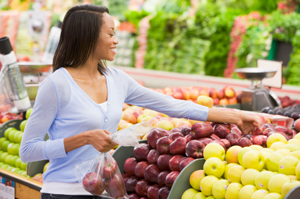Eco Groceries Are Nutritious and Minimize Pollution
Download Audio VersionEco groceries are vegetables, fruits, and other products that are produced locally and reduce the amount of carbon emissions released into the atmosphere. There are different ways to buy green groceries, including local farmers’ markets, food co-ops, and specialty grocery stores. Alternatively, you can visit a local farm that offers fresh produce.
Food Co-ops
One way to buy fresh fruits and vegetables is to join a co-op that pools members’ funds and buys local produce. They usually support farmers and natural and organic food producers. There are many benefits to joining a co-op, including revitalizing local communities, making it easier for environmentally conscious consumers to find groceries, and others. There are different types of food cooperatives, including stores, buying and pre-order clubs, and others. With pre-order clubs, the members of the co-op pool orders and buy green groceries from a local farmer or supplier. Members may rotate and pool orders, collect money, and distribute groceries. While pre-order and buying co-ops are usually small, this is not always the case. The main advantage is that members buy products at affordable prices. They purchase in bulk and are often offered a discount. The focus is on good quality and eco groceries rather than fancy foods. Stores can also take the form of food co-ops that offer green products. They offer quality products and limited product lines and remove the frills. Volunteers who work in such stores enjoy discounts on different products in exchange for their work. Opening a store, however, requires better organization and more money to rent or buy a store, invest in equipment, and buy groceries and other products. Both stores and pre-order co-ops should have a dependable supplier that offers organic or green groceries.
Groceries and Going Green

It is a good idea to buy in bulk. In this way, you will drive to the store less often and will purchase large quantities. Your groceries will be packaged together which means that you won’t use as many bags and packaging (good for the environment). You may also want to bring your own boxes, bags, or packaging with you. Opt for cloth grocery bags instead of plastic and paper bags. If you must buy packaged items, you may want to choose products that come with recycled or recyclable packaging. This way, you will save some trees. Buying products in glass jars is also a way to minimize environmental pollution. Glass can be recycled multiple times. In addition, you can buy a number of products from bulk bins, including pasta, beans, nuts, and dried fruits.
Most people are meat eaters and can’t go without fish and meat. However, meat production and processing has adverse effects on a number of ecosystems and uses more energy, resources, and land than fruits and vegetables. Different methods are used, including hunting, intensive livestock production, organic farming, and others. The problem with meat production is that it is associated with waste accumulation, intensive water and land use, fossil fuels and other non-renewable resources, and water, air, and soil pollution. Going green means limiting the amount of meat that you consume. Fruits and vegetables are cheaper than meat and contain essential minerals, antioxidants, and other substances. When buying veggies, opt for organic and local produce. Intensive farming techniques, pesticides, and herbicides contribute to soil erosion and pollution. Buying local produce is important in many ways. First, you will eat fresh fruits and vegetables that are picked at their peak. Second, the short time between the producer and your home means that products won’t lose their nutritional value. Exotic fruits and vegetables are shipped by planes and trucks (often picked green), and they sit in warehouses for days and weeks before you buy them. Third, local fruits and vegetables are safe. Farmers take responsibility because people in their community know them personally. Never go grocery shopping when hungry. You will buy many products you don’t need, i.e. wasted food.
Benefits of Organic Produce
Organic fruits and vegetables are more nutritious and safer than conventionally grown produce. Moreover, organic farming is said to contribute to water and soil conservation and does less damage to the environment. Organic agriculture reduces the need for non-renewable sources such as fossil fuels and helps mitigate global warming and the greenhouse effect. It helps protect biodiversity as the seeds are more resilient to changes in weather conditions and diseases. The absence of harsh chemicals and pesticides means that green groceries are not only healthy but help protect various ecosystems and habitats around organic fields. Different techniques are used, including crop rotation, which minimize soil erosion and improve fertility. Another advantage is that organic crops are not grown together with genetically modified species.
Related Articles
Green School Lunches to Reduce Waste
Schools of average size produce over 20 tons of waste annually. In fact, research studies in the US show that school waste accounts for close to 24 percent of the total waste Fruits, vegetables, and salads are wasted the most. Young kids produce more waste than older students. Reasons for Food...
Growing Organic Produce Packed with Essential Nutrients
There are many arguments in favor of organic fruits and vegetables, and the main ones are more nutrients and fewer herbicides and pesticides. A study conducted by researchers at Newcastle University reveals that organic crops contain up to 40 percent higher levels of iron, zinc, vitamin C, and...
5 Tips to Recycle at Home and Save Valuable Resources
Recycling at home is a great way to reduce organic and other waste and show concern for the environment. There are simple solutions and recycling systems that can be installed in your house. Some people use dumpster-style bins and collect unbroken glass, plastics, cans, and papers. Others choose to...


